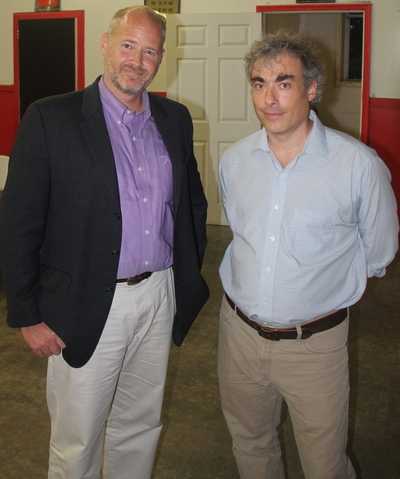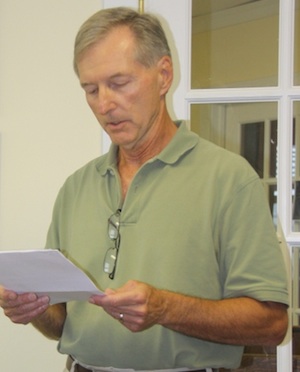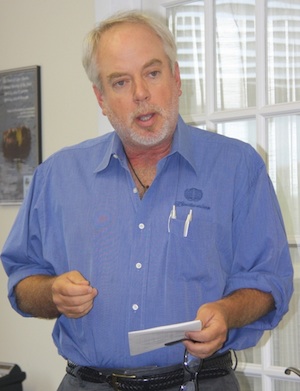ANALYSIS: Judge Dismisses Old School Lawsuits

Early photo of 1912 Cape Charles School at Central Park. Town has paid a developer over $200,000 in cash and incentives to take the building, parking lot, and basketball court. Another $80,000 went for legal fees.
By GEORGE SOUTHERN
Cape Charles Wave
March 4, 2013
Circuit Court Judge Revell Lewis has dismissed lawsuits contesting the sale and rezoning of the old Cape Charles school and parkland.
The local civic organization Old School Cape Charles had submitted a litany of reasons to the court why the sale and rezoning were illegal, including improper notice, defective application documents, violation of the Town of Cape Charles Comprehensive Plan, unlawful “contract zoning,” arbitrary and capricious votes by Town Council, and violation of equal protection and due process.
Judge Lewis declined to consider any of the complaints, finding instead that no legal provision exists to contest them.
Lewis found that the Virginia code “contains no provision authorizing an action contesting a decision of a local governing body to sell or dispose of its real estate or an appeal thereof to this Court.”
Lewis also cited a Virginia Supreme Court opinion that severely limits a third-party challenge to a governmental action, and therefore found “no statutory authority” for challenging Town Council’s actions.
The judge’s ruling would appear to give carte blanche to municipalities. While the Town is bound by state law, the judge saw no way for a group of citizens to compel adherence by the Town to any law — at least not in the Circuit Court.
CONTINUED FROM FIRST PAGE
Judge Lewis made his opinions known in letters dated February 27 to attorneys for the Town and Old School. Official rulings must still be prepared.
The letters may be read here.
Cape Charles Town Manager Heather Arcos did not mention the letters during the six-hour Town Council meeting February 28. The first news from the Town came Friday afternoon (March 1) by email in the Town Gazette.
On hearing the news, Old School Cape Charles President Wayne Creed said, “We fought as hard as we could to save the school and the gym for our kids, but we came up short. It’s kind of hard to look at my own kids right now, realizing that I let them down.”
The court challenge incurred substantial legal fees on both sides. Records show that since July 1 of last year, the Town has spent almost $64,000 on the cases.
That does not include additional costs paid by the Virginia Municipal League after the Town reached its maximum deductible. It also does not include $15,000 the Town paid its attorney to review the sale of the Old School property for $10.
Counsel for the defense was supplied by three law firms — two in Richmond and one in Norfolk. Old School Cape Charles had only one attorney — Kevin Martingayle of Virginia Beach.

Old School Crab Fest: A rainy July night demonstrated the benefit of a large indoor space for community gatherings. (Wave photo)
Old School Cape Charles held several fundraisers to help defray legal costs, the most successful being a crab and music fest last July in the Wendell Distributing warehouse on Madison Avenue, attended by several hundred people.
Supporters noted that if the Old School became a community center, the gymtorium would be an ideal venue for such events — especially given its location in Central Park.
The Old School group also held yard sales as well as an oyster roast in October, which turned out to be the same weekend as Hurricane Sandy.
The history of Old School Cape Charles predates the controversy surrounding sale of the school to a private developer. Old School Cape Charles was begun in 2009 by Mayor Dora Sullivan, Frank Wendell, and Lee Goldman. The group planned to apply for grant funding to restore the school building for public use.
Some time before April 2008, Town staff proposed that the school building be used for workforce housing, and that the gymtorium become the new Town library.
But the Friends of the Library group opposed locating the library in the school, and the workforce housing idea, as set forth by Town Planner Tom Bonadeo, got little support.
Former Town Council member Larry Veber has publicly criticized the Old School group for “ignoring” the school until Town Council decided to give it away to a developer.
But Wendell, now a Town Council member, has responded that the Old School group became dormant in late 2009 only because the Town planned to lease the building to Cape Charles Christian School. Old School Cape Charles then closed its bank account and donated its funds to the Christian School.
Some time later the Christian School determined that it did not have sufficient resources to lease the school. Then, during the summer of 2011, the Town began secret talks with Echelon Resources, Inc., a small firm that has converted several public buildings into apartment houses and condominiums.

Developers Edwin Gaskin and J. David McCormack (Wave photo)
Echelon is composed of two partners: Edwin Gaskin of Richmond and J. David McCormack of Petersburg. Echelon’s business model is to apply for state and federal historic tax credits for up to 45 percent of the cost of converting old buildings into housing.
Under tax credit rules, Echelon is also allowed to charge a “developer fee,” and then file for a 45 percent reimbursement in tax credits of the fee it paid itself.
According to the Virginia Department of Historic Resources, there are no guidelines or restrictions concerning developer fees.
At the Mallonee School in Hopewell, for example, Echelon paid itself a developer fee of over $1,175,000 on an otherwise under $6 million project. Echelon also got tax credits for a $100,000 “local government fee” for the same building.
But in Cape Charles there was no “local government fee.” To the contrary, the Old School appears to be the first instance in which, instead of Echelon’s paying for the building, the owner (Town of Cape Charles) is paying Echelon.
In its negotiations with Town staff, Echelon partner Edwin Gaskin maintained that he needed to surmount a “$160,000 funding gap.” In other words, for Echelon to make a profit, it wanted the Town either to give it $160,000 or to reduce its costs by an equal amount.
An email discussion between Gaskin and Assistant Town Manager Bob Panek detailed a plan for the Town to lease back the school’s gymtorium for use as a library at an annual cost of $85,600 plus utilities. But that idea was not taken seriously by anyone else.
Panek then suggested filing for insurance proceeds for damage to the school building believed to have been sustained during the August 23, 2011, earthquake.
Under normal insurance rules, damage must be reported within 60 days after an incident. But the Town did not raise the issue until December, after twice the normally maximum time period to file a claim had elapsed.
Ultimately the Town received $41,000 insurance proceeds, which it is giving to Echelon. (The Wave has learned from the Virginia Municipal League that, contrary to information from Panek, the Town was under no obligation to pass insurance claim proceeds to the buyer of the building.)
Panek handled the rest of the “funding gap” by convincing Town Council to reduce water and sewer hookup fees.
For a 17-unit apartment, the standard fee was $209,950, which the Town reduced to $52,500, saving Echelon $157,500 — a generous amount over the remaining “gap.”
Adding the utility hookup savings to the insurance payment equals some $200,000 in cash or credits that the Town is providing Echelon.
That doesn’t include the gift of the building, parking lot, and basketball court, assessed by the County at a value of $921,000.
Town officials say that another basketball court will be built somewhere else, but no decisions have been made. The cost will be at Town expense.

Former basketball court sits unused after Town removed hoops for the developer. (Wave photo)
The Town has also closed access from the former parking lot to the park playground. A new entrance was built, but remains closed due to flooding. Town Manager Arcos has mentioned possibly building a bridge from the Park to access the new entrance, but nothing has been decided yet.
It is not known how Echelon discovered the Old School property, which was never offered for sale by the Town.
McCormack’s wife is from Nassawadox, and he has acknowledged that she “has a relationship” with Arcos.
The Wave has reported that Town Council’s executive sessions to discuss conveying the school and park property to Echelon Resources failed to notify the public as required by the Virginia Freedom of Information Act.
For example, the Town’s January 21, 2012, executive session agenda, when secret negotiations were underway with Echelon, referred only to an “Unsolicited Confidential Proposal.” There was no mention that the proposal was to sell the Old School.
Virginia code 2.2-3712 requires that “No closed meeting shall be held [without] a motion that . . . identifies the subject matter . . . . A general reference to the . . . subject matter of the closed meeting shall not be sufficient to satisfy the requirements for holding a closed meeting” (emphasis added).
After the Wave repeatedly cited the law (and after the Echelon sale proposal became public), Town Council began following proper procedure for executive sessions. For example, the specific subject of a recent Council closed session was described as “South Port Lease Amendment.”
In addition to failing to state the specific subject of the January 12, 2012, executive session, Town Council appears to have violated FOIA law by even holding a closed meeting to consider an “unsolicited confidential proposal.”
Virginia code only authorizes closed sessions for “Discussion or consideration of the acquisition of real property for a public purpose, or of the disposition of publicly held real property, where discussion in an open meeting would adversely affect the bargaining position or negotiating strategy of the public body” (emphasis added).
Town Council held nine closed sessions on selling the school. Making the sessions public (as the Town did during earlier discussions to lease the building to the Christian School) could not have adversely affected the Town — although it could have harmed Echelon’s position, if it resulted in other parties making competing offers.
The reason Town Council kept the unsolicited offer secret appears to be to avoid public opposition. As the Wave reported October 9 last year, emails obtained under the Virginia Freedom of Information Act show that the town manager and assistant town manager manipulated the date for signing the contract giving away the school and park property.
“It will be a smoother transition with our May 1st elections to execute the contract on May 10th,” the town manager wrote in April.

Assistant Town Manager Bob Panek: the driving force behind the sale of the Old School. (Wave photo)
The assistant town manager was more blunt: “We are trying to avoid possible electoral consequences of contract approval just before the May 1 election,” he wrote.
The “possible electoral consequences” could only be that the incumbents might not be re-elected if they gave away the school and park property before the election.
When news got out that the Town was planning to sell the school, the Old School Cape Charles group reorganized with many new members. On March 19, 2012, Old School submitted a proposal to Town Council to lease the building for use as a community center.
A group of Old School members came to a Council work session March 22 but had to wait outside the room for an hour while Council held a closed session about the sale of the school.
Ironically, when the open session began, Old School representatives were informed that their “proprietary/confidential proposal” could not be discussed in an open meeting.
Previous closed sessions had included non-Council guests such as the Echelon developers, but the Old School proposal was never heard by Council in either closed or open session.
On April 4, 2012, Mayor Sullivan sent a letter to Old School Cape Charles informing the group that the proposal had been rejected by Town Council.
State law requires decisions by a town council to be made in public, but no vote was ever taken on the rejection.

Town Council member Frank Wendell: the driving force behind efforts to keep the Old School for public use. (Wave photo)
On June 12, 2012, the Old School group hand-delivered the mayor a revised proposal modeled after the historic Onancock School. The proposal received only a verbal rejection.
On June 26, 2012, the Old School Cape Charles attorney sent a letter to the mayor offering to purchase the school for $10,000. Mayor Sullivan rejected the offer without formally presenting it to Town Council.
The mayor also dismissed an offer from Northampton County Supervisors to provide financial support for a community center. “The cost to provide a historic restoration is prohibitive at $2-4 million,” she wrote to Supervisor Willie Randall, noting that “one exterior wall collapsed as a result of the earthquake last year and the estimate to repair that wall alone was approximately $200,000.”
The estimate was grossly inflated. A January 25, 2012, damage report by FEMA states that “the quake caused 5,220 bricks to dislodge.” But Wave staff have counted the number of bricks that fell and found the number closer to 500. The FEMA estimate thus is 10 times the actual damage.
The Virginia Municipal League estimated an actual cash value loss of $66,000 — less than a third of FEMA’s estimate of $228,000.
(During Town Council public comment time, this writer disputed the mayor’s claim, noting that the 3-course brick wall had not collapsed, only some of the bricks in outer courses had fallen, and an independent professional had estimated repair at less than $20,000.)
The 2006 Shriver Holland report, five years before the earthquake, highlighted problems with the same wall: “The exterior wall along the west side of the east wing has pulled away from the floor framing. . . . Geotechnical investigation should be provided to determine cause of wall movement. Wall may need to be re-anchored and additional foundation support provided.”
But other than paying $18,000 for the report, the Town did nothing to shore up the wall. In fact, the Wave has found that the Town spent almost no money to maintain the Old School over the past 20 years.
Bay Creek developer Brown & Root did pay $69,000 for a new school roof in 1995 as a proffer during negotiations to annex Bay Creek to the Town. The Town contributed an additional $10,000 for the roof job.
The Town charged the Wave $106 in staff costs to provide access to budget records revealing that virtually no maintenance was done on the school in decades.
Section 8.23 of the Town Zoning Ordinance states: All buildings and structures in the Historic District shall be preserved against decay and deterioration and maintained free from structural defects to the extent that such decay, deterioration, or defects may, in the opinion of the Historic District Review Board and Town Council result in the irreparable . . . deterioration of exterior walls.”
Another tactic used to portray the school as an albatross was the claim that the cost of asbestos removal would be prohibitive. In fact, no asbestos removal is required, and the new owner plans to erect drywall at minimal expense to contain what asbestos exists.
After the sales contract was signed, an engineer for the developer inspected the building and pronounced it in remarkably good shape.
When Town Council deliberated converting the school into an apartment building, they clearly were concerned that the apartments could become Section 8 low-income housing.
A February 27, 2012, email from Assistant Town Manager Bob Panek to developer Edwin Gaskin states: “Heather [Arcos] indicated that Council does want a few refinements in the purchase contract language. The two significant things seem to be: 1) Prohibition for using the building for Section 8 subsidized housing. 2) Less than 100% waiver of water/sewer connection charges if the insurance proceeds with tax credit leverage exceed the $165K gap. Do you have any issue with the above?”
Gaskin wrote back the same day: “Bob — No problem on the Section 8 prohibition, and you should phrase it like that ‘HUD Section 8′ financing or something like that specifically.”
When the Town first made public its intent to sell the school and parkland for $10 to Echelon Resources, Town staff distributed a leaflet entitled “FREQUENTLY ASKED QUESTIONS,” which stated:
“Will this be low income housing?
No, they are not HUD Section 8 or Virginia Department of Housing and Community Development subsidized housing. They will be upscale, “urban loft” type units, with a targeted rental rate of $600-800 month.”
The contract with Echelon as signed June 28, 2012, by Mayor Sullivan, stated: “To the extent permitted by law, Purchaser shall not operate the Project as a low-income housing facility under any state or federal program.”
Subsequently, three prominent civic leaders protested to elected state officials over alleged discriminatory housing practices by the Town.
The contract language “is offensive to all of us who have fought for ‘fair housing’ in Virginia and in Northampton County,” the civic leaders wrote in letters to State Senator Ralph Northam and Delegate Lynwood Lewis, with copies to Senator Tim Kaine and Northampton Supervisor Willie Randall.
The letters were signed by Lenora Mitchell, president of Concerned Citizens of Cape Charles; Alice Coles, president of Bayview Citizens for Social Justice; and Jane Cabarrus, president of Northampton County NAACP.
On February 7, Arcos signed an amendment to the contract removing the low-income prohibition. The action was taken without consulting members of Town Council.
Town history suggests that over time the Old School apartments almost surely will become subsidized low-income housing. Unlike in larger urban areas where Echelon has dealt in the past, in Cape Charles there is likely to be little interest in paying full rate for a one-bedroom unit in an institutional-type apartment house.
School teachers usually are the preferred renters in Cape Charles, and the Wave did find a teacher currently renting a duplex in the Historic District who was eager to move into the Old School with his two dogs.
Another teacher and her boyfriend, also living in a duplex with a dog, said that a one-bedroom apartment would be too small for them.
Meanwhile, former Council member Bruce Evans, who voted to sell the school, has for months been advertising one or more one-bedroom apartments for rent on the corner of Tazewell and Fig.
The only likely alternative to subsidized housing in the Old School is if the developers sell condominiums, which they are allowed to do after five years of ownership. But Gaskin told Arcos in a March 28, 2012, email that “we cannot guarantee that we will condo the building. . . . lenders don’t like the word ‘condo’.”
Gaskin and McCormack did a good sales job with the Town — so much so that Town Council declined to put the school up for bid or entertain any other offer. “No one else could do as good a job,” a Council member told the Wave.
Town Council was so enamored of Echelon that it ignored the Town attorney’s advice to require a performance bond and buyback provision in the sales contract. Echelon argued that a performance guarantee was a waste of money, because they had a reputation to defend. The Town agreed, and deeded the school without requiring any guarantee.
In another twist, most of the negotiations over the sale were with Edwin Gaskin, a partner in Echelon, and the sales contract was with Echelon Resources. But at closing, the Town signed the deed over to Charon Ventures.
Gaskin’s name does not appear linked to Charon Ventures. He appears instead to be the “closer,” after which his partner, McCormack, takes over ownership.
According to the sales contract, the purchaser (Echelon) may not transfer the contract “without prior written approval of Seller (Town of Cape Charles). Records do not reveal any written approval by the Town to transfer the contract to Charon Ventures.
McCormack’s dealings with the town of Blackstone are worth noting: When he delayed paying utility hookup fees, the town threatened to cut off water to the building’s tenants. McCormack told the Wave at the time (September 2012) that he was “negotiating” the fees.
A member of the Blackstone Town Council saw it differently: “We have been played by a professional,” he said.
In Blackstone, McCormack received a building permit before paying utility connection fees. In Cape Charles, Town Council passed a special ordinance allowing him to do the same thing here.
Cape Charles town code requires payment of water and sewer connection fees at time of issuance of a building permit — unless Town Council authorizes a special payment arrangement. Town Manager Heather Arcos confirmed to the Wave that according to the same ordinance, even with a special arrangement the connection fees must be paid no later than the time of actual hookup of the water and sewer lines.
But on June 14, 2012, Town Council passed a special ordinance overriding the normal rules. McCormack will not have to pay water and sewer connection fees until issuance of a certificate of occupancy for Cape Charles Lofts.
As of this writing, Echelon (now Charon Ventures) still has not received approval for tax credits from the Virginia Department of Historic Resources. The state rejected Echelon’s first submission last November 21, citing three areas where conversion to an apartment house would not be in keeping with the historic nature of the original school building.
But the developers are in close contact with the Department of Historic Resources, and in fact have hired a former Historic Resources employee, Paige Pollard, to submit their paperwork. Past history is of initial rejection by the Department, followed by submission of a redesign that is approved.
Approval by the Town’s Historic District Review Board is also required. The Review Board has so far advised that converting the Old School into apartments is “not appropriate.”
Town Planner Tom Bonadeo has recommended that the Review Board receive professional training on applications for historic rehabilitation, and plans to hire Paige Pollard to provide the training.
Currently there is only one member sitting on the Review Board. The other four resigned after being overruled by Town Council on another issue.
As the Wave noted last week, at least one facet of the whole long story is worth a laugh. Now that all has been said and done, the closing completed, and the deed of sale recorded, visitors to the historic office of the Northampton County Clerk of Court may examine the deed, which states: “This Deed is made this 20th day of December, 2102 . . . .”
It has been, as Shakespeare said, A Comedy of Errors.
DISCLOSURE: Wave staff are affiliated with Old School Cape Charles.




















It appears that the only winners here are the lawyers.
Well, it sure was impossible for me to tell which side of the debate this article was for.
GEORGE REPLIES: I knew I wouldn’t have to wait long before someone would say the story is biased, which provides me the opportunity to point out that the headline clearly states ANALYSIS. It is not a straight news story and is not portrayed as one. An analysis is by definition subjective. An analysis also draws a conclusion. Glad you were able to tell that.
It’s so sad that the town gave away the building to the developer instead of making it into a community center. The fact of the matter is the people running this town couldn’t care less about the children that live here. All the people running this town care about are tourists! Now we will have an apartment building right on the edge of the park. No basketball court and NO PARKING for the playground.
Point taken George.
As a lawyer planning to retire in Cape Charles, I am happy to see there are plenty of job prospects. As a taxpaying property owner, I wish the $64,000 in legal fees the town was forced to spend defending these frivolous lawsuits could have been put to better use improving the town.
Thank you for a thorough, concise chronology of this entire debacle. I can’t believe Judge Lewis chose a political decision over a legal adjudication of the true events that transpired. A solid legal decision based on the facts of the case would go a long way towards helping to heal the rift in the town. This decision only adds fuel to the fire.
Keep up the good work.
Ms. Bauer may want to describe the court challenge to municipal actions that have raised eyebrows across the state as “frivolous,” but I’m sure Judge Lewis would disagree. The Town brought in, from Norfolk and Richmond, three of the most powerful law firms in the state. Judge Lewis heard five hours of Virginia case law (covering decisions from the last 70 years) regarding the issue from both sides. He did not rule from the bench, but due to the complexity of the case, spent nearly 30 days before issuing a written decision.
Frivolous? To the contrary, not challenging the Town’s actions in court would have been “frivolous.”
The judge’s decision essentially granted a “demurrer.” As Wikipedia so aptly describes it, a demurrer is an opposing lawyer saying “so what?” This was not a ruling on the merits. This was a finding that the plaintiff (OSCC) failed to state a cognizable claim in a court of law. Whereas, the opinions may have been passionately held and the issues vigorously argued by expensive lawyers willing to take the plaintiff’s money, at the end of the day, so what?